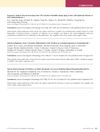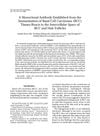 1 citations,
December 2020 in “bioRxiv (Cold Spring Harbor Laboratory)”
1 citations,
December 2020 in “bioRxiv (Cold Spring Harbor Laboratory)” Sox9 levels in brain stem cells affect whether they stay as stem cells or become neurons.
1 citations,
December 2020 in “International journal of molecular sciences” External factors can cause skin cancer cells that usually don't spread to grow and form tumors in mice.
 1 citations,
November 2020 in “Research Square (Research Square)”
1 citations,
November 2020 in “Research Square (Research Square)” The study found specific skin cells and genes that may affect the quality of cashmere in Liaoning Cashmere Goats.
1 citations,
February 2020 in “Regenerative Medicine” Significant progress and collaborations in stem cell research and regenerative medicine were made, including advancements in hair growth, cancer therapies, and treatments for neurological disorders.
 1 citations,
January 2020 in “bioRxiv (Cold Spring Harbor Laboratory)”
1 citations,
January 2020 in “bioRxiv (Cold Spring Harbor Laboratory)” The research mapped out the cell types and molecular processes involved in developing Cashmere goat hair follicles.
1 citations,
August 2019 in “Chinese Medical Journal” A man developed facial skin lesions after a stem cell transplant, which improved with specific treatments.
1 citations,
April 2019 in “The journal of investigative dermatology/Journal of investigative dermatology” Fibroblasts and myeloid cells in mouse skin wounds are diverse and can change into different cell types during healing.
1 citations,
January 2019 in “Advances in stem cells and their niches” Epidermal stem cells are crucial for skin health and problems with them can cause issues like poor wound healing, cancer, and aging.
1 citations,
November 2018 in “immuneACCESS” Expanded CD8+ T cells are linked to Alopecia Areata and may cause relapse after treatment.
 1 citations,
April 2018 in “Journal of Investigative Dermatology”
1 citations,
April 2018 in “Journal of Investigative Dermatology” PRC1 is essential for proper skin development and stem cell formation by controlling gene activity.
 1 citations,
January 2018 in “Elsevier eBooks”
1 citations,
January 2018 in “Elsevier eBooks” The skin's dermal layer contains true stem cells with diverse functions and interactions that need more research to fully understand.
 1 citations,
February 2016 in “European Journal of Obstetrics & Gynecology and Reproductive Biology”
1 citations,
February 2016 in “European Journal of Obstetrics & Gynecology and Reproductive Biology” An 84-year-old woman's hair loss was due to a rare condition called Leydig cell hyperplasia, which was treated with surgery.
 1 citations,
February 2015 in “Clinical and Experimental Dermatology”
1 citations,
February 2015 in “Clinical and Experimental Dermatology” A man got six skin cancers within a year after a cell transplant for leukemia but was cancer-free 32 months later; skin checks are important post-transplant.
 1 citations,
September 2012 in “Journal of Investigative Dermatology”
1 citations,
September 2012 in “Journal of Investigative Dermatology” Aging reduces stem cell activation, leading to hair loss in mice lacking a specific enzyme.
 1 citations,
September 2011 in “UHOD : Uluslararası hematoloji - onkoloji dergisi”
1 citations,
September 2011 in “UHOD : Uluslararası hematoloji - onkoloji dergisi” Looking at tissue characteristics isn't reliable for telling apart basal cell carcinoma from certain benign skin tumors.
 1 citations,
February 2010 in “Proceedings of SPIE”
1 citations,
February 2010 in “Proceedings of SPIE” Low level laser therapy may help regenerate hair cells in the ear after damage from gentamicin.
1 citations,
January 2010 in “Springer eBooks” Hair cloning could solve the problem of limited donor hair in transplants.
 1 citations,
July 2007 in “Regenerative Medicine”
1 citations,
July 2007 in “Regenerative Medicine” Stem cell research and regenerative medicine have made significant advancements in treating various diseases and conditions.
 1 citations,
November 2002 in “Journal of dermatology”
1 citations,
November 2002 in “Journal of dermatology” The antibody created from BCC tissues reacts similarly to both BCC and hair follicles, suggesting BCC may come from hair follicle cells.
 1 citations,
December 1998 in “PubMed”
1 citations,
December 1998 in “PubMed” Surgery on a 68-year-old woman with an ovarian tumor led to reduced hirsutism and normal testosterone levels.
1 citations,
January 1989 in “Carcinogenesis” Dexamethasone reduces inflammation and delays skin cell changes caused by TPA.
 January 2025 in “bioRxiv (Cold Spring Harbor Laboratory)”
January 2025 in “bioRxiv (Cold Spring Harbor Laboratory)” Potential therapeutic targets for scarring hair loss are identified.
 January 2025 in “PLoS ONE”
January 2025 in “PLoS ONE” ING5 is crucial for stem cell maintenance and preventing certain cancers.
 December 2024 in “Biomaterials Research”
December 2024 in “Biomaterials Research” Exosomes from hair stem cells can reduce skin aging from UVB exposure.
 December 2024 in “Research Square (Research Square)”
December 2024 in “Research Square (Research Square)” Placental stem cell exosome therapy improves hair growth and reduces hair loss.

Stem cell therapy shows promise for treating hair loss in androgenetic alopecia.
 October 2024 in “Journal of the Endocrine Society”
October 2024 in “Journal of the Endocrine Society” Leydig cell tumors can cause high testosterone and symptoms like hair loss in postmenopausal women, but surgery can improve these symptoms.
 October 2024 in “Journal of the Endocrine Society”
October 2024 in “Journal of the Endocrine Society” Leydig cell tumors can cause high testosterone and symptoms in postmenopausal women, and removing them improves symptoms.
 September 2024 in “British journal of surgery”
September 2024 in “British journal of surgery” Autologous stem cell therapy may effectively increase hair density in Androgenetic Alopecia.

Mesenchymal stem cell-derived exosomes significantly increase hair density and thickness in androgenic alopecia patients.





















